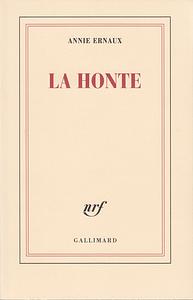Take a photo of a barcode or cover
emotional
informative
reflective
tense
fast-paced
Shame is a lonely, heavy burden that keeps on giving; and as is the case often when social/economic classes meet, it is reserved especially for those who do not have the means to live better, be better, know better.
Ernaux grew up in quite a poor environment, raised by rather rough people, as us clear as she describes her hometown and the divisions lines by class within its quarters (of which she was on the wrong side), and the uncouth experiences that shaped her, topped with when her father tried to kill her mother, followed by them acting like it had been nothing.
But how can it be nothing for a child? If you're not already used to such violence (in which case you have larger problems), seeing your beloved parents in such violence against each other is enough to throw off one's whole understanding of how human relations are supposed to work, how the world is supposed to work. That it's traumatic is undeniable.
Looking back, now highly educated and economically better off, she both remembers the fear, and the shame, and must feel it still, the shame that came into being once she as a child learned to look at herself and her family the way other people did; because shame is not something innate, something that stands alone, but it exists in comparison - you cannot feel shame if you don't know you should be feeling it.
Shame is something you learn; or at least what there is to be ashamed of (because there is nothing objectively shameful, only culturally and subjectively); and that, as Ernaux describes her memories, tends to be intrinsically tied to such things that those with money and power can afford, and those without cannot:
Pretty things, indoor plumbing, warm water, running water, big TVs, a car, a bigger car, an education, a fancier education from a school everybody knows the name of, the knowledge and ability and a way to control one’s anger so that it doesn't devolve into murderous intent - there's always something, big or small, that one can feel ashamed of; and having been raised in a working class family myself where for years we didn't have warm water, and using used things was he name of the day, I can relate to what she is talking about.
But it doesn't stop in childhood, and you could write a book, many a book, of what one can find shameful in adulthood; and another one from the point of view of the mother, almost killed, and the father, almost a killer, and them together, acting like it never happened because how else can you continue living your life?
And then ultimately ask, what is the value of all that shame? How did it help? For Ernaux that question doesn't seem to even register, perhaps because the futile answer is so obvious.
Even so, reading the first chapter, I did not feel that Ernaux had much to say about the event itself, half-forgotten trauma that coloured her life and defied reasoning but happened, let's not forget, so many years ago. Falling back to her usual tricks, the endless lists of snippets of memories, these old things, old ads, old songs, places as they used to be; and in part it felt too familiar, losing its power, no less because this time I shared none with this person with such different nostalgias (no familiar French movies this time).
But taken as a whole, Ernaux's masterful writing, her penchant for thoughtful self-analysis, and her central thesis of working class shame prevails, and the complete thing builds into a formidable creation on shame, violence, and class that is now one of my favourite writings from Ernaux.
Ernaux grew up in quite a poor environment, raised by rather rough people, as us clear as she describes her hometown and the divisions lines by class within its quarters (of which she was on the wrong side), and the uncouth experiences that shaped her, topped with when her father tried to kill her mother, followed by them acting like it had been nothing.
But how can it be nothing for a child? If you're not already used to such violence (in which case you have larger problems), seeing your beloved parents in such violence against each other is enough to throw off one's whole understanding of how human relations are supposed to work, how the world is supposed to work. That it's traumatic is undeniable.
Looking back, now highly educated and economically better off, she both remembers the fear, and the shame, and must feel it still, the shame that came into being once she as a child learned to look at herself and her family the way other people did; because shame is not something innate, something that stands alone, but it exists in comparison - you cannot feel shame if you don't know you should be feeling it.
Shame is something you learn; or at least what there is to be ashamed of (because there is nothing objectively shameful, only culturally and subjectively); and that, as Ernaux describes her memories, tends to be intrinsically tied to such things that those with money and power can afford, and those without cannot:
Pretty things, indoor plumbing, warm water, running water, big TVs, a car, a bigger car, an education, a fancier education from a school everybody knows the name of, the knowledge and ability and a way to control one’s anger so that it doesn't devolve into murderous intent - there's always something, big or small, that one can feel ashamed of; and having been raised in a working class family myself where for years we didn't have warm water, and using used things was he name of the day, I can relate to what she is talking about.
But it doesn't stop in childhood, and you could write a book, many a book, of what one can find shameful in adulthood; and another one from the point of view of the mother, almost killed, and the father, almost a killer, and them together, acting like it never happened because how else can you continue living your life?
And then ultimately ask, what is the value of all that shame? How did it help? For Ernaux that question doesn't seem to even register, perhaps because the futile answer is so obvious.
Even so, reading the first chapter, I did not feel that Ernaux had much to say about the event itself, half-forgotten trauma that coloured her life and defied reasoning but happened, let's not forget, so many years ago. Falling back to her usual tricks, the endless lists of snippets of memories, these old things, old ads, old songs, places as they used to be; and in part it felt too familiar, losing its power, no less because this time I shared none with this person with such different nostalgias (no familiar French movies this time).
But taken as a whole, Ernaux's masterful writing, her penchant for thoughtful self-analysis, and her central thesis of working class shame prevails, and the complete thing builds into a formidable creation on shame, violence, and class that is now one of my favourite writings from Ernaux.
emotional
reflective
slow-paced
emotional
reflective
fast-paced
informative
reflective
medium-paced
challenging
dark
emotional
challenging
reflective
medium-paced
emotional
informative
inspiring
reflective
fast-paced
challenging
emotional
reflective
sad
medium-paced



